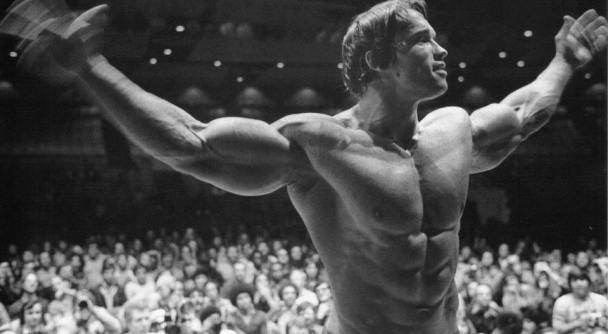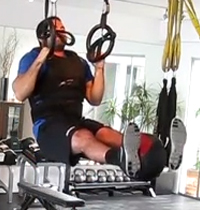Choose Strength


By Ben Bruno
I’m a big believer in the adage “success leaves clues,” and I’m very interested in looking at commonalities between people that are successful in various endeavors.
Getting strong in the gym is an interesting one that on the surface doesn’t make a whole lot of sense.
It definitely isn’t just a matter of genetics.
Sure that’s inevitably part of it, but having worked with a lot of good athletes, it’s clear that there’s not always a correlation between natural athletic ability and strength. In fact, there rarely is. The strongest guy on the team generally isn’t the strongest one in the weight room.
I actually chuckle when people—usually lazy and weak people—talk about strong dudes in the gym being “genetic freaks” because the vast majority of avid lifters (myself included) turn to lifting as their “sport” after realizing they could no longer hack it in their original sport of choice.
I’ve never heard of a dude turning down a lucrative career in the NFL to pay to lift weights at the local gym.
Lifting takes very little talent, so there’s a lot more to it than that.
It’s not about the program either because people get strong using all sorts of different programs and methodologies.
I’d argue is has a lot more to do with mindset and habits.
Here are some common attributes of strong people.
1. Strong people don’t doubt themselves
I can’t stand when someone asks me to spot them on the bench and when I ask them how many reps they’re doing, they respond with “I’m supposed to get 6 but I’m not sure if I can.”
My response is always the same: Come get me when you’re sure.
Ask a strong person that same question and he’ll answer confidently: “I’m going to get 6.” Or better yet, “I’m supposed to get 6 but I think I can get 7.”
This isn’t just word games or semantics.
There’s absolutely no room for self-doubt when you’re under the bar. Timid lifting is weak lifting. You better be damn sure of yourself.
2. Strong people are always looking to add weight to the bar
After a set I’ll ask my clients how it felt. I’m amazed how often I hear something to the effect of, “that felt pretty heavy, I think we should stop there,” even when the weight flew up and it looked easy and it’s obvious they could handle more.
Newsflash: it’s supposed to feel heavy! They’re called weights, after all.
Not surprisingly, these people usually aren’t very strong.
Strong people will almost always plead their case to add weight, even in situations where they probably aren’t ready to. As a coach, this means that I’m sometimes forced to be the bad guy and hold them back from upping the weight too quickly, but I love when I find someone will this mentality.
It’s some simple and so basic, yet surprisingly rare.
Remember, strength training implies that you actually get stronger. If you aren’t continually striving to add weight to the bar, you’re wasting your time.
3. Strong people are consistent
Three years ago I started training a high school hockey team during the winter. After the season, five or six kids stuck around and lifted four days a week in the spring while the rest of the team stopped lifting entirely and went off to play baseball, lacrosse, or video games.
During the summer, those same 5-6 kids kept lifting four days a week and were joined by four or five of their teammates. The newcomers immediately saw that they’d lost a lot of the strength they’d build up during the winter, and they also noticed that they were way behind the kids that had kept lifting all spring. That sold them and they kept lifting during the fall too.
At the start of the next season, it was like the tale of two teams: those who’d lifted all year and those that hadn’t. The difference was blatant, and the kids that had slacked off during the offseason knew it.
After that second winter I had almost the entire team coming in 3-4 days a week all year-round, and the results have been astounding and as a team they’re a lot stronger than most teams they’re age.
I have them do an extremely basic program, and I like to joke that I created the “+5” system of periodization that consists of doing the same stuff over and over again but trying to add five pounds each time.
My results with those guys has been much more a matter of convincing them (and more importantly, their parents) to come to the gym consistently than anything I’m doing with regards to the X’s and O’s. Those five pound increments really add up over time if you don’t take any prolonged breaks.
4. Strong people are tougher
I’m not sure if strong people have a higher pain threshold than weak people or they simply just ignore the pain. It’s probably a combination of both, but whatever the reason, strong people are able to endure discomfort better.
You don’t hear them bitching that they can’t lift because of blisters or that holding the front rack position bothers their collarbone.
They’re also able to push themselves much harder during the actual set.
Weak people stop a set because it starts to get hard. Strong people live for that moment because that’s where the real fun begins.
It’s important to note that there’s a major difference between the pain that comes from injury and the discomfort that comfort that comes from pushing yourself.
The former is bad and should be avoided, while the latter is inevitable if you’re training hard and must be overcome if you’re looking to achieve any real results.
5. Strong people seek out stronger people
The fastest way to get strong is to train with stronger people.
Strong people intuitively know this and seek out people stronger than themselves to push them to the next level. They don’t worry about looking weak or being embarrassed. They just care about getting better and are able to put their ego aside to do so.
Weak people are too self-conscious, so instead they seek out fellow weaklings to feel better about themselves and revel in their collective mediocrity.
Success breeds success just like mediocrity breeds mediocrity. Choose wisely.
6. Strong people tend to be less analytical than weak people
Weak people tend to be more cerebral and think—or more aptly overthink—every little detail through and must be completely sure it makes sense to them before they’ll try it.
Strong people, on the other hand, tend to jump right in and try stuff and worry about the “why” later, after they’ve seen if it works or not.
It’s important to learn and acquire knowledge, but when it comes to getting strong, at some point you just have to dummy up and lift.
7. Strong people err on the side of doing more, while weak people err on the side of doing less
Weak people will look for any excuse they can to skip a workout and try to get out of doing the hard things. These are the types that skip leg day because they’re “sick” yet miraculously recover in record time just in time to bench the next day.
Strong people are the exact opposite. They prioritize the hard things because they know that’s what’ll produce the most results, and they’ll even ask for more on top of that.
If they feel like they could’ve done a little more weight on their last set of deadlifts, they’ll do an extra set.
I had a kid that as an eighth and ninth grader used to beg me to do 20-30 minutes of heavy sled pushes at the end of the workout while he waited for his mom to pick him up. Not surprisingly, several years later that kid is one of the strongest high school kids I’ve ever worked with and outlifts most college kids.
This past summer one of the freshman stayed after the workout and did hang cleans for a full hour and a half on his own, unbeknownst to me. I can’t even imagine how many sets he did. I had to put on my coach hat and tell him not to overdo it, but secretly I was thrilled to see it and I suspect in a year or two he’ll be a beast too.
Weak people worry about overtraining while strong people are too busy kicking the shit out of themselves to care.
It’s worth mentioning thought that strong people also tend to get hurt more than weak people. The fact that they’re handling bigger weights is obviously a big reason why, but most gym injuries could be prevented if people would listen to their bodies more.
Strong people tend to suck at this. Rather than assess how they’re feeling on a daily basis, they ignore how they feel and go to war with the logbook at all costs. While there’s something to be said for this relentless persistence, it’s also important to evaluate how you’re feeling and adjust accordingly if need be.
8. Strong people eat more
It never ceases to amaze me when I see a skinny weak dude start intermittent fasting or cutting out carbs and then wonder why he’s not getting stronger or building muscle. Go figure.
Just like you have to train like you mean it to get strong, you always have to eat like you mean it too.
Wrap Up
If you’re not satisfied with your strength gains, rather than bitch about your genetics or spend hours on end analyzing and overthinking the minutia of your training program, you may just need to change your attitude and the way you approach your training. Get to it!
ABOUT THE AUTHOR

Ben Bruno graduated Summa Cum Laude from Columbia University. He lives in Los Angeles, California and trains clients at Rise Movement training studio. He publishes a free blog and newsletter at www.benbruno.com.
Facebook: https://www.facebook.com/pages/Ben-Bruno/282118145176459?ref=hl
Twitter: https://twitter.com/benbruno1
Instagram: http://instagram.com/brb082985
YouTube: http://www.youtube.com/user/bruno082985
